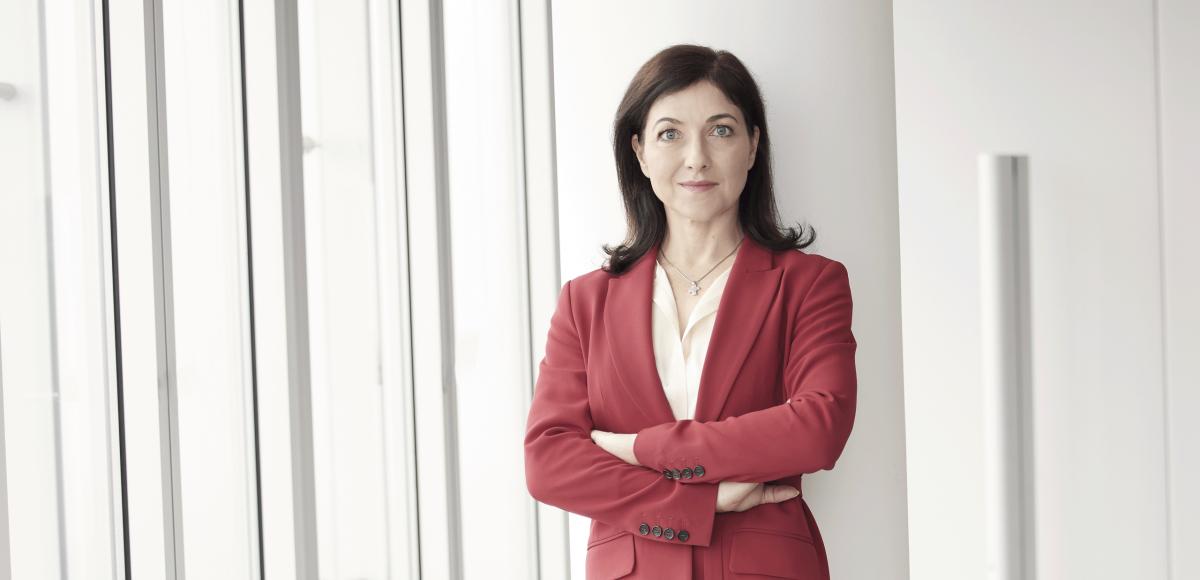
Inevitable - An interview with Katherina Reiche
She is one of the leading managers shaping the energy world of tomorrow. For Katherina Reiche, CEO of Westenergie, hydrogen is the defining energy vector of the future.
Ms Reiche, we originally just wanted to discuss the topic of hydrogen with you in this interview. The war in Ukraine, however, does not only dominate headlines and the political agenda, but has also a significant impact on the energy industry. What does the conflict mean for supply security and what for the future energy supply in Europe?
The terrible and completely unjustified invasion of Ukraine by Russia has produced incredible suffering and pain for millions of people. Our hearts go out to those affected by this unforgivable aggression, and it is they who are on top of our minds. But you are right: This war is also a turning point for European energy supply and thus for the energy industry. For us at Westenergie, this is first and foremost a time in which the primacy of politics applies. We are following the lead of the Federal Government and the European Union and look at them to define the necessary steps to be taken throughout the industry in the short and mid term.
Looking at the bigger picture, it is probably safe to say that Putin's invasion has increased the urgency, but also the difficulty of driving security of supply, climate protection and competitiveness forward - while keeping all these factors in balance. Now three steps are crucial: Firstly, we need to diversify the gas supply and especially minimise our dependency on gas from Russia. We need to do that very level-headedly: Gaseous energy carriers will continue to be indispensable as mainstay of our energy supply system in the future – natural gas in the short and medium term, hydrogen in the long term.
Secondly, we have to massively expand renewable energy production and synchronise this with the expansion of the grid. And finally, we must ramp up the hydrogen economy with new urgency. Green molecules are the key to redesign our energy system to be both sustainable and resilient to crises. It is therefore commendable that the Federal Government and the European Union are taking these steps.
You are the chairwoman of the National Hydrogen Council, which advises the German government. Why do you believe in hydrogen as a key enabler for the energy transition and what is the council doing on a practical level to enable hydrogen to play its role as an energy vector?
Hydrogen will be a fundamental and indispensable pillar of our energy system - especially with the new challenges resulting from the Russian invasion of Ukraine. It is the perfect addendum to renewables, as hydrogen allows us to store electricity over a long period without great energy loss. So that when renewable energies cannot fully supply our energy demand, we convert hydrogen to energy. Beyond that, hydrogen is the only efficient decarbonisation option in sectors where electrification is neither possible nor economically feasible. In a nutshell: hydrogen is a must-have.
In order for hydrogen to fulfil this role in the near future, the National Hydrogen Council was established in 2020. We are advising the Federal Government, but also act as a mediator between political actors, academia, CSOs, and industry, and as a driver for hydrogen generally. We have, for example, conducted a meta-study on hydrogen. It summarises all current research into hydrogen in Germany and allows us to give a precise overview of anticipated minimum, maximum and most probable national hydrogen demand. We have also submitted our recommendations on current legislative proposals regarding the implementation of the National Hydrogen Strategy and the ramp-up of a hydrogen economy. And we have made recommendations on how to implement and further develop the National Hydrogen Strategy itself. Last year we published the Hydrogen Action Plan, which proposes 80 measures on how to further develop the strategy - some of which have already been taken up by the new government.
What time horizon are you thinking of when you talk about hydrogen as the energy source of the future and in which sectors do you see it being deployed before 2030?
As I said: Russia's invasion of Ukraine is a turning point. And it will be an accelerator for the hydrogen economy. The fact is: Hydrogen will be the energy source of the future - and the future is developing at breathtaking speed. The German government just recently doubled its ambitions for the national electrolysis capacity in 2030 from five to ten gigawatts. We see hydrogen buses and refuse collection vehicles appearing on the roads.
Of course, it will still take a few years before hydrogen is widely used. This will require a comprehensive hydrogen infrastructure and the availability of large quantities of climate-neutral hydrogen on the market. A recent study by the Federation of German Industries (BDI) expects Germany to have a hydrogen and Power-to-Liquid (PtL) demand of 110 terawatt hours in 2030. I am convinced that we will see hydrogen in all sectors by 2030 - and not just a few selected ones. The potential for GHG reductions is too significant and the need for action on climate change too urgent for us not to seize this opportunity.
For example, hydrogen can play a key role in the decarbonisation of the heating market. In Germany, 51% of all flats were built before 1970. For technical reasons, electric heat pumps will hardly become a comprehensive heating option in these existing buildings in the short term. Climate-neutral hydrogen distributed through the existing gas infrastructure is a fast and cost-effective decarbonisation option for such buildings. We must seize such opportunities and not limit them by restricting hydrogen to individual sectors.

In the H2.Ruhr project you are working with Enel and Iberdrola to build a hydrogen value chain both on your own doorstep and yet across European borders. Can you reflect a little for our readers on the project background and its goals?
H2.Ruhr is a project developed by E.ON and Westenergie to jointly build-up a cross-border European green hydrogen value chain. The project initially foresees the delivery of up to 80,000 tonnes of green hydrogen and green ammonia per year in the Ruhr region and from there to our gas distribution network. Around 3,900 industrial customers are connected to our grid, accounting for about 40 per cent of the withdrawal volumes. Compared to the national average of 16 per cent, this illustrates the high industrial density in the region. If the corresponding gas quantities were replaced by hydrogen, up to 2 million tonnes of CO2, could be saved per year.
E.ON plans to start construction for a 20 MW electrolysis plant in the Ruhr region by 2025 as the project's first step. Enel will supply this electrolyser with green electricity from wind and solar energy from Italy. In parallel, Iberdrola will set up its own hydrogen production in Spain and transport green hydrogen in the form of ammonia by ship to Germany. H2.Ruhr also includes the construction of a regional hydrogen pipeline infrastructure with a direct connection to a broad spectrum of consumers in the Ruhr area.
This project is unique as it is the first example of such an integrated, pan-European project. It will test new innovative technologies at scale, such as the ammonia cracking technology, electrolysis, emission-free transport (via hydrogen or ammonia powered vessels or trucks), as well as the long-distance transport of electricity dedicated for hydrogen production.
The hydrogen policy for Germany seems to rely heavily on hydrogen imports rather than attempting to become self-sufficient. Can you explain why this is? And what measures Germany is putting in place to secure hydrogen imports from outside the EU?
Germany has always had an enormous energy demand due to its size and strong industrial sector. We have been a net importer of energy for a long time and our dependency on external energy suppliers won't end in a carbon-neutral future. In 2020, we imported around 71% of our energy. We assume that in 2030 we will need to import at least 40% of our hydrogen, and in 2050 it will be as much as 60%.
A good example for Germany's massive hydrogen demand is the country's largest steel plant, owned by thyssenkrupp in Duisburg. To operate this one plant in a climate-neutral way, thyssenkrupp needs 720,000 tonnes of hydrogen per year. To produce this amount of hydrogen, green electricity from about 3,800 wind turbines is needed. If all steel production in Germany would be converted to hydrogen, this alone would require the amount of electricity from 12,000 additional wind turbines of the large five-megawatt class.
We cannot meet such an energy demand domestically. Here, climate and development partnerships should strengthen multilateral cooperation. There are plans to form an international "climate club" with a uniform minimum CO2 price, as well as a global emissions trading system with a uniform CO2 price in the medium term. All this highlights how important European and international aspects are to the hydrogen economy. And it shows why the Russian war against Ukraine has made it even more urgent for Germany and the EU to speed up hydrogen imports.
Doing business sustainably can mean deciding against more successful short term solutions. What advice do you have for players in the energy industry, from utilities to policymakers, on how best to articulate the short term challenges relative to the long term benefits?
Let me speak for Westenergie. We try to act responsibly and sustainably - for our employees and the environment. Short term gains can be very tempting, especially as many decision-makers are often measured by short term goals. However, a manager or politician who approaches his duties with social responsibility and foresight knows that such behaviour will not lead to success in the medium or long term. It is clear that with a rising CO2 price, a fast growing availability of renewable energies and a massive increase in electrolyser capacity, green technologies will become the cheaper option in the medium term.
A climate-neutral world is just as inevitable as the large-scale use of hydrogen.
